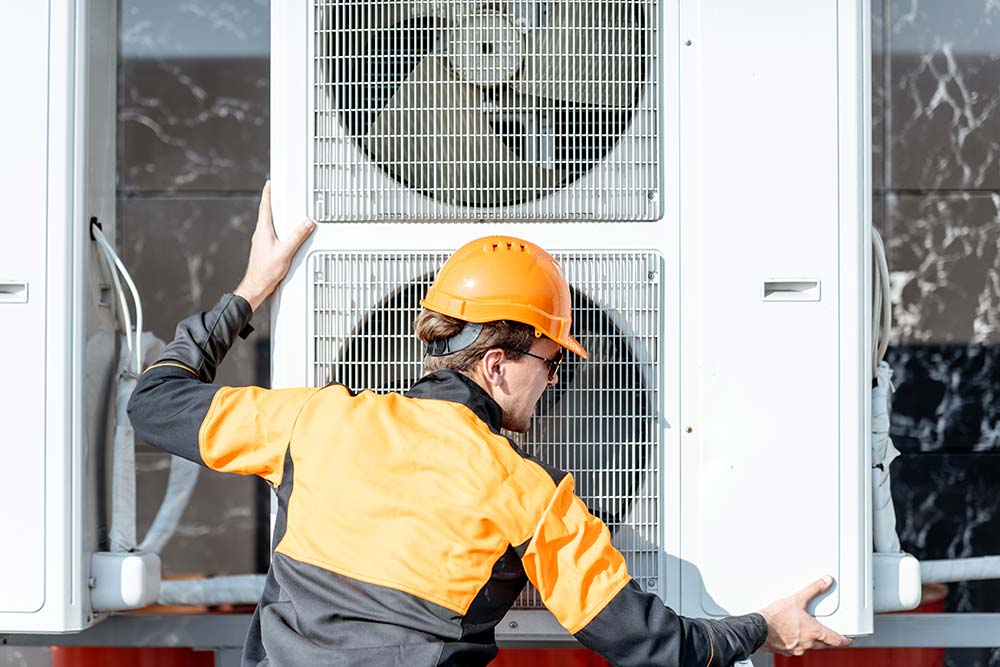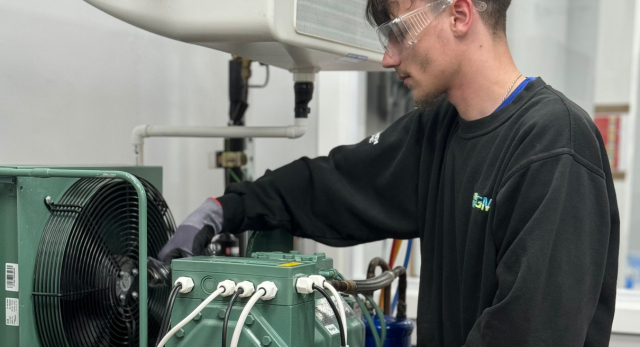Technically, yes.
However, manufacturer and specialised heat pump contractor umbrella schemes provide an alternative approach, allowing gas and heating installers to test the waters of their local market before committing to MCS accreditation.
In this blog, we’ll explain the benefits and risks of this approach and explore its role supporting the growth of the heat pump sector, while levelling the small-scale renewables playing field for sole traders and small businesses.
What is an MCS umbrella scheme?
MCS umbrella schemes offer heating installers the opportunity to tap into the heat pump market without going through the long process of becoming certified themselves.
Under an umbrella scheme, an MCS certified organisation completes the design and commissioning of a new heat pump system, including heat loss calculations, specification and supply of components and equipment, but the installation is subcontracted out to a heating engineer.
Who is responsible – the umbrella scheme operator or the subcontractor?
The operator company takes responsibility for the whole process, completing all the relevant paperwork and issuing MCS certificates to the end user so that they can apply for government schemes, including the Boiler Upgrade Scheme (BUS).
MCS consulted on umbrella schemes at the end of last year and is due to publish best practice guidance for operating companies soon. Under MCS 001-1, scheme operators are required to:
- Have a formal written agreement with the subcontractor which clearly sets out the scope of the work and the standards expected
- Ensure the subcontractor is demonstrably competent for the work they are undertaking.
- Ensure the subcontractor has appropriate insurance.
- Ensure all the subcontractors’ personnel receive relevant training.
- Supervise and assess the work undertaken by subcontractors
- Assume full responsibility for the installation at handover and raise the appropriate MCS certificate.
What are the benefits of this approach?
If heat pump installation makes up such a small proportion of your business that you can’t justify MCS certification, or you’re unsure of the demand in your local area, an umbrella scheme could help you:
- Test the market – A chance to dip your toe in the water before committing to the time and responsibility of MCS registration.
- Build your customer base – Receive referrals from customers in your local area who enquire about heat pump installation with your umbrella scheme operator.
- Gain valuable experience of the growing heat pump sector – installers can get first-hand experience of heat pump systems without the responsibility of system design.
- Get free manufacturer training – Most umbrella scheme operators offer or require installers to undertake free product training.
A step in the right direction, but not the end game
Installers working under umbrella schemes still need to be trained, but the advantage comes from the reduced cost, time, complexity and risk of becoming MCS certified.
For sole traders and small businesses, this new business model provides a useful ‘first-step’ into a new sector, levelling the playing field so it’s not just big companies benefiting from rapid growth over the next 5 – 10 years.
With the benefit of this early experience in a relatively low-risk environment, installers can build their experience and confidence at their own pace and become MCS accredited when the time is right for them.
What training do I need to become a heat pump installer?
We recommend that all heating engineers working on heat pumps undertake the relevant training courses, including:
WRAS Water Regulations training – provides a detailed overview of the Water Regulations (1999), essential for heating and plumbing installers and a pre-requisite to further qualifications.
Low Temperature Heating and Hot Water (LTHHW) Systems in Dwellings – this LCL Awards Level 3 qualification has been developed alongside CIPHE, the Heat Pump Association and their members to ensure all future heating systems are designed with a low temperature aim from the outset to maximise efficiency. Understanding LTHHW system design is valuable to all installers, including those working under schemes where the ultimate responsibility lies elsewhere.
Level 3 Award in the Installation and Maintenance of Air Source Heat Pumps – This regulated RQF qualification is for plumbing and heating engineers who want to achieve a nationally recognised qualification in the installation and maintenance of Air Source Heat Pumps Systems (Non-refrigerant Circuits). This qualification is recognised by the MCS registration bodies to join the scheme.
How do I become a heat pump installer?
There are several options, including:
- MCS Umbrella Scheme – Register with an MCS umbrella scheme, undertake relevant training and subcontract your services as a heat pump installer. Support is available from a range of manufacturers and companies, including:
This is not a limited list and Logic4training does not recommend any specific provider. You’ll need to do your own research and check the specific requirements and benefits of each scheme before you make a decision.
- MCS Install Only – Building on existing plumbing / heating & ventilation / gas / oil qualifications, complete WRAS Water Regulations (if you don’t hold it already) and LCL Awards Level 3 Award in the Installation and Maintenance of Air Source Heat Pumps. Apply for MCS certification for install only of heat pumps. Under this route, you must also have a contract in place with a qualified and MCS certified design engineer.
- MCS Installation and Design – Again, building on existing plumbing / heating & ventilation / gas / oil qualifications, complete WRAS Water Regulations (if you don’t hold it already), LCL Awards Level 3 Award in Low Temperature Heating and Hot Water Systems Design in Dwellings and LCL Awards Level 3 Award in the Installation and Maintenance of Air Source Heat Pumps. Apply for MCS certification for the installation and design of heat pumps, enabling you to assume responsibility for the full scope of work and issue MCS certificates to the end user.
Find out more about becoming MCS certified.









